Docklands Academy: Leadership and Management Report (2018-2019)
VerifiedAdded on 2021/01/01
|9
|2530
|18
Report
AI Summary
This report provides a comprehensive analysis of leadership and management principles within the context of the service industry, specifically focusing on the hospitality sector. The report begins by examining classical management theories and their application within the restaurant chains Hazev, Haz, and Tas, which are in partnership with Docklands Academy. It delves into Henri Fayol's principles, Frederick Taylor's contributions, and their relevance to operational efficiency. The report then explores various leadership styles, including autocratic, democratic, and transformational approaches, and assesses their impact on employee motivation and satisfaction. Furthermore, the report investigates the internal and external factors influencing management styles and organizational structures, such as technological advancements, legal frameworks, and social trends. The report concludes by highlighting the importance of adapting leadership styles to suit different situations, emphasizing the need for both hard and soft skills in effective management and leadership within the service sector. The report uses the case study of Docklands Academy and its partner restaurants to exemplify the concepts discussed.
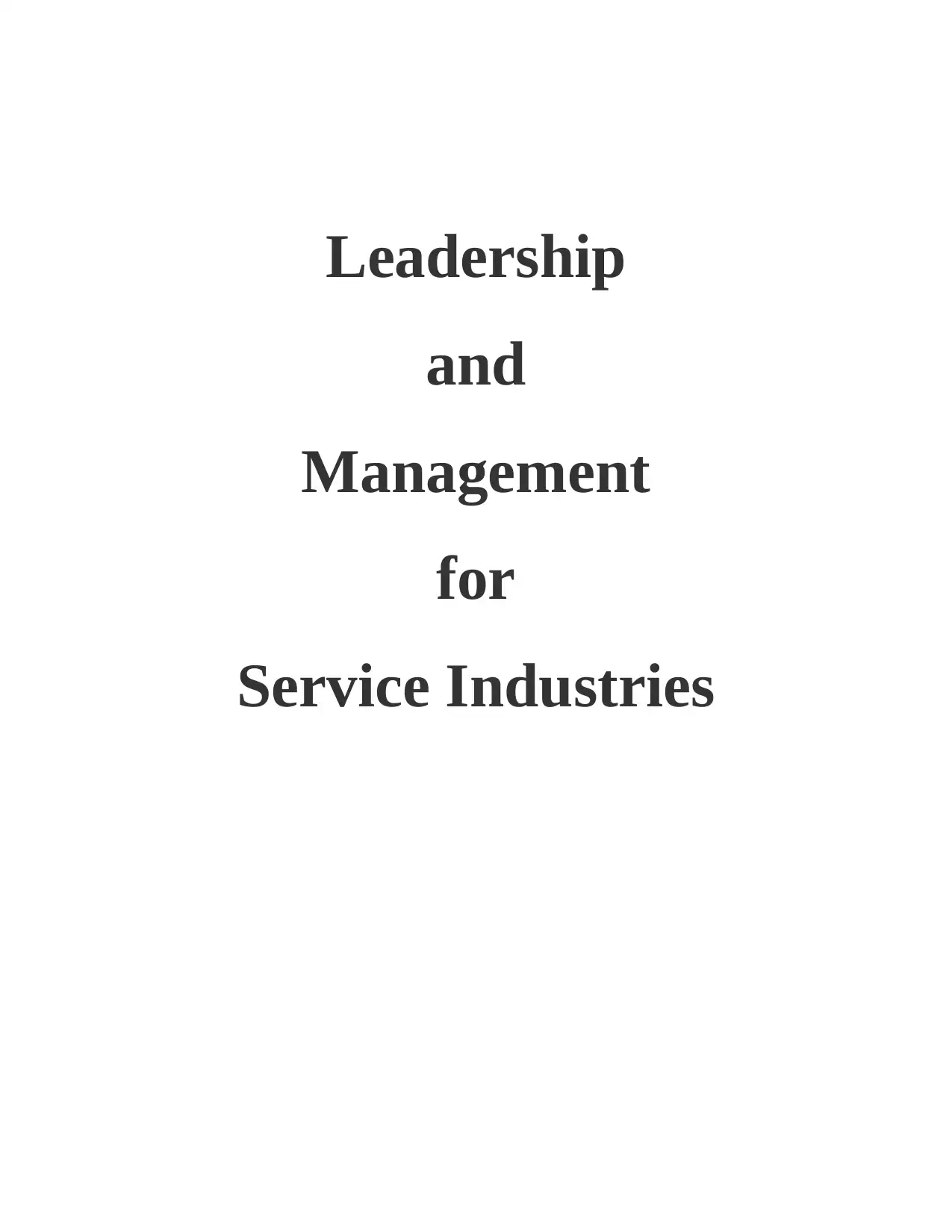
Leadership
and
Management
for
Service Industries
and
Management
for
Service Industries
Paraphrase This Document
Need a fresh take? Get an instant paraphrase of this document with our AI Paraphraser
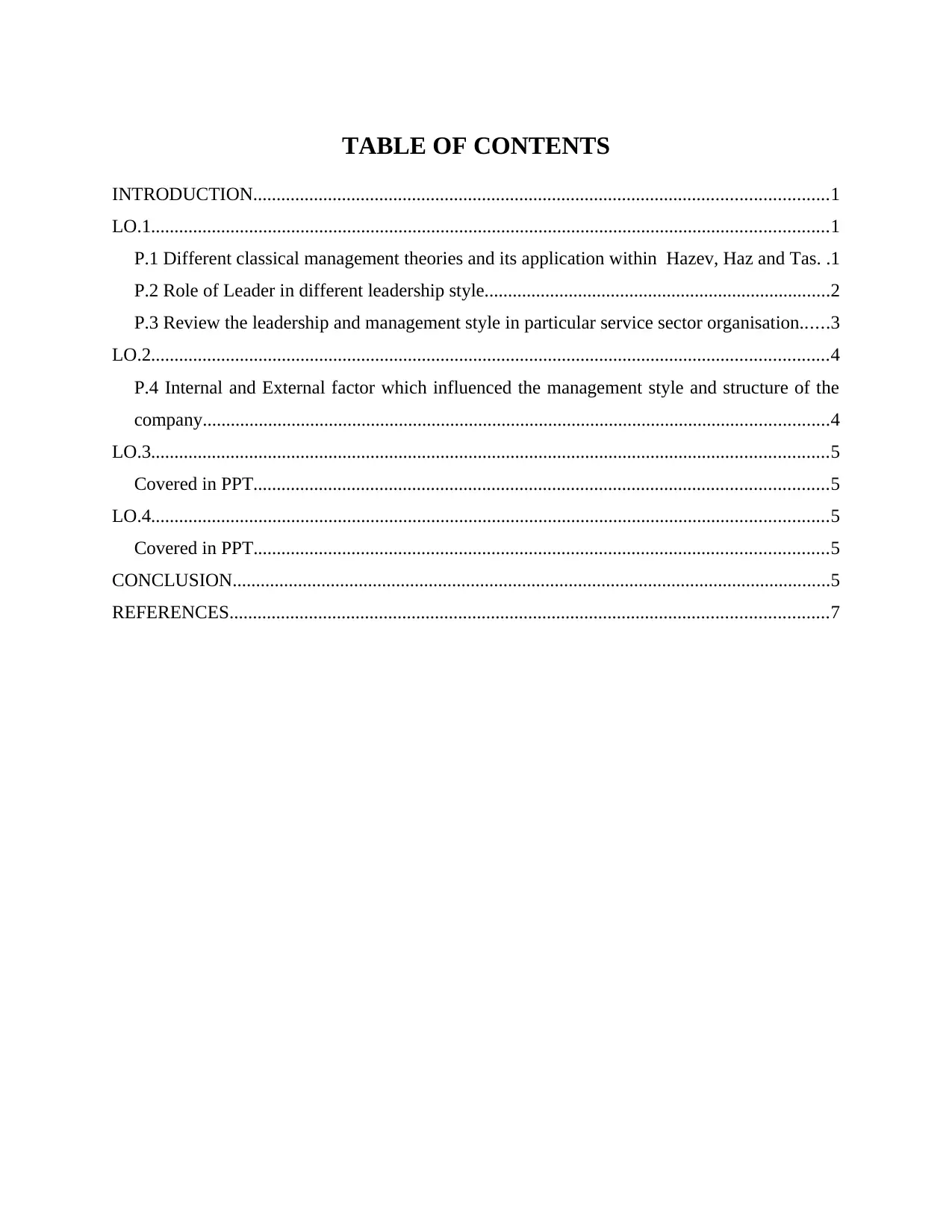
TABLE OF CONTENTS
INTRODUCTION...........................................................................................................................1
LO.1.................................................................................................................................................1
P.1 Different classical management theories and its application within Hazev, Haz and Tas. .1
P.2 Role of Leader in different leadership style..........................................................................2
P.3 Review the leadership and management style in particular service sector organisation......3
LO.2.................................................................................................................................................4
P.4 Internal and External factor which influenced the management style and structure of the
company......................................................................................................................................4
LO.3.................................................................................................................................................5
Covered in PPT...........................................................................................................................5
LO.4.................................................................................................................................................5
Covered in PPT...........................................................................................................................5
CONCLUSION................................................................................................................................5
REFERENCES................................................................................................................................7
INTRODUCTION...........................................................................................................................1
LO.1.................................................................................................................................................1
P.1 Different classical management theories and its application within Hazev, Haz and Tas. .1
P.2 Role of Leader in different leadership style..........................................................................2
P.3 Review the leadership and management style in particular service sector organisation......3
LO.2.................................................................................................................................................4
P.4 Internal and External factor which influenced the management style and structure of the
company......................................................................................................................................4
LO.3.................................................................................................................................................5
Covered in PPT...........................................................................................................................5
LO.4.................................................................................................................................................5
Covered in PPT...........................................................................................................................5
CONCLUSION................................................................................................................................5
REFERENCES................................................................................................................................7
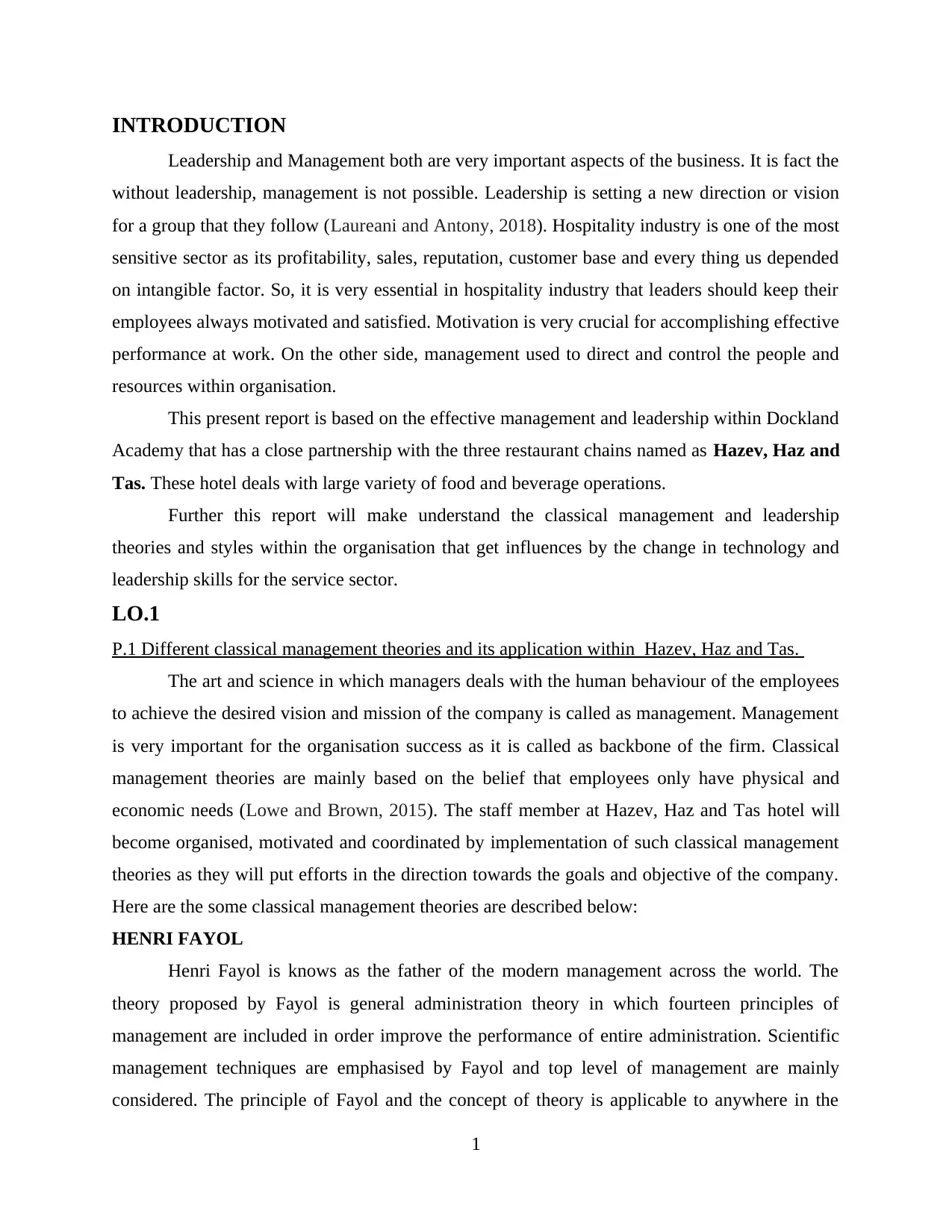
INTRODUCTION
Leadership and Management both are very important aspects of the business. It is fact the
without leadership, management is not possible. Leadership is setting a new direction or vision
for a group that they follow (Laureani and Antony, 2018). Hospitality industry is one of the most
sensitive sector as its profitability, sales, reputation, customer base and every thing us depended
on intangible factor. So, it is very essential in hospitality industry that leaders should keep their
employees always motivated and satisfied. Motivation is very crucial for accomplishing effective
performance at work. On the other side, management used to direct and control the people and
resources within organisation.
This present report is based on the effective management and leadership within Dockland
Academy that has a close partnership with the three restaurant chains named as Hazev, Haz and
Tas. These hotel deals with large variety of food and beverage operations.
Further this report will make understand the classical management and leadership
theories and styles within the organisation that get influences by the change in technology and
leadership skills for the service sector.
LO.1
P.1 Different classical management theories and its application within Hazev, Haz and Tas.
The art and science in which managers deals with the human behaviour of the employees
to achieve the desired vision and mission of the company is called as management. Management
is very important for the organisation success as it is called as backbone of the firm. Classical
management theories are mainly based on the belief that employees only have physical and
economic needs (Lowe and Brown, 2015). The staff member at Hazev, Haz and Tas hotel will
become organised, motivated and coordinated by implementation of such classical management
theories as they will put efforts in the direction towards the goals and objective of the company.
Here are the some classical management theories are described below:
HENRI FAYOL
Henri Fayol is knows as the father of the modern management across the world. The
theory proposed by Fayol is general administration theory in which fourteen principles of
management are included in order improve the performance of entire administration. Scientific
management techniques are emphasised by Fayol and top level of management are mainly
considered. The principle of Fayol and the concept of theory is applicable to anywhere in the
1
Leadership and Management both are very important aspects of the business. It is fact the
without leadership, management is not possible. Leadership is setting a new direction or vision
for a group that they follow (Laureani and Antony, 2018). Hospitality industry is one of the most
sensitive sector as its profitability, sales, reputation, customer base and every thing us depended
on intangible factor. So, it is very essential in hospitality industry that leaders should keep their
employees always motivated and satisfied. Motivation is very crucial for accomplishing effective
performance at work. On the other side, management used to direct and control the people and
resources within organisation.
This present report is based on the effective management and leadership within Dockland
Academy that has a close partnership with the three restaurant chains named as Hazev, Haz and
Tas. These hotel deals with large variety of food and beverage operations.
Further this report will make understand the classical management and leadership
theories and styles within the organisation that get influences by the change in technology and
leadership skills for the service sector.
LO.1
P.1 Different classical management theories and its application within Hazev, Haz and Tas.
The art and science in which managers deals with the human behaviour of the employees
to achieve the desired vision and mission of the company is called as management. Management
is very important for the organisation success as it is called as backbone of the firm. Classical
management theories are mainly based on the belief that employees only have physical and
economic needs (Lowe and Brown, 2015). The staff member at Hazev, Haz and Tas hotel will
become organised, motivated and coordinated by implementation of such classical management
theories as they will put efforts in the direction towards the goals and objective of the company.
Here are the some classical management theories are described below:
HENRI FAYOL
Henri Fayol is knows as the father of the modern management across the world. The
theory proposed by Fayol is general administration theory in which fourteen principles of
management are included in order improve the performance of entire administration. Scientific
management techniques are emphasised by Fayol and top level of management are mainly
considered. The principle of Fayol and the concept of theory is applicable to anywhere in the
1
⊘ This is a preview!⊘
Do you want full access?
Subscribe today to unlock all pages.

Trusted by 1+ million students worldwide
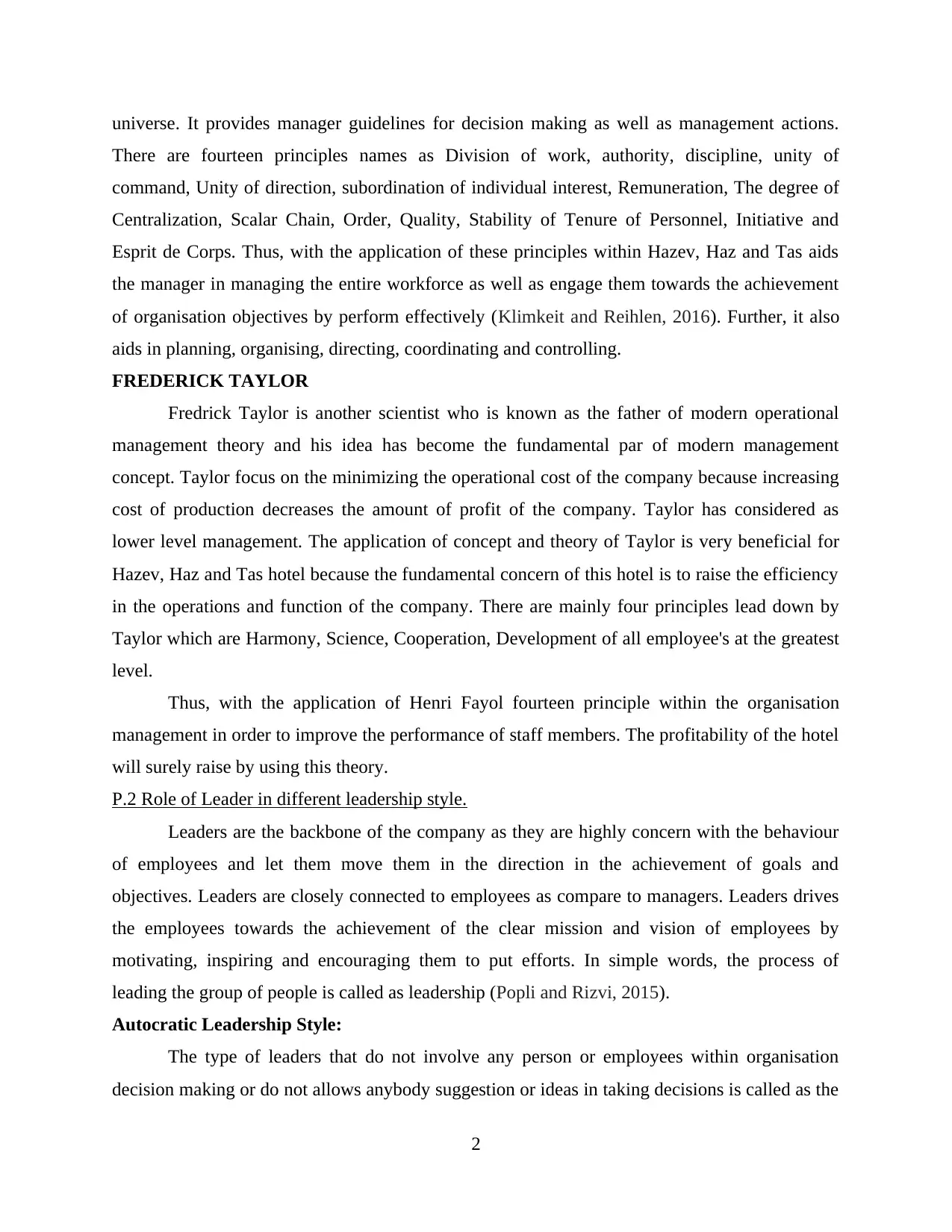
universe. It provides manager guidelines for decision making as well as management actions.
There are fourteen principles names as Division of work, authority, discipline, unity of
command, Unity of direction, subordination of individual interest, Remuneration, The degree of
Centralization, Scalar Chain, Order, Quality, Stability of Tenure of Personnel, Initiative and
Esprit de Corps. Thus, with the application of these principles within Hazev, Haz and Tas aids
the manager in managing the entire workforce as well as engage them towards the achievement
of organisation objectives by perform effectively (Klimkeit and Reihlen, 2016). Further, it also
aids in planning, organising, directing, coordinating and controlling.
FREDERICK TAYLOR
Fredrick Taylor is another scientist who is known as the father of modern operational
management theory and his idea has become the fundamental par of modern management
concept. Taylor focus on the minimizing the operational cost of the company because increasing
cost of production decreases the amount of profit of the company. Taylor has considered as
lower level management. The application of concept and theory of Taylor is very beneficial for
Hazev, Haz and Tas hotel because the fundamental concern of this hotel is to raise the efficiency
in the operations and function of the company. There are mainly four principles lead down by
Taylor which are Harmony, Science, Cooperation, Development of all employee's at the greatest
level.
Thus, with the application of Henri Fayol fourteen principle within the organisation
management in order to improve the performance of staff members. The profitability of the hotel
will surely raise by using this theory.
P.2 Role of Leader in different leadership style.
Leaders are the backbone of the company as they are highly concern with the behaviour
of employees and let them move them in the direction in the achievement of goals and
objectives. Leaders are closely connected to employees as compare to managers. Leaders drives
the employees towards the achievement of the clear mission and vision of employees by
motivating, inspiring and encouraging them to put efforts. In simple words, the process of
leading the group of people is called as leadership (Popli and Rizvi, 2015).
Autocratic Leadership Style:
The type of leaders that do not involve any person or employees within organisation
decision making or do not allows anybody suggestion or ideas in taking decisions is called as the
2
There are fourteen principles names as Division of work, authority, discipline, unity of
command, Unity of direction, subordination of individual interest, Remuneration, The degree of
Centralization, Scalar Chain, Order, Quality, Stability of Tenure of Personnel, Initiative and
Esprit de Corps. Thus, with the application of these principles within Hazev, Haz and Tas aids
the manager in managing the entire workforce as well as engage them towards the achievement
of organisation objectives by perform effectively (Klimkeit and Reihlen, 2016). Further, it also
aids in planning, organising, directing, coordinating and controlling.
FREDERICK TAYLOR
Fredrick Taylor is another scientist who is known as the father of modern operational
management theory and his idea has become the fundamental par of modern management
concept. Taylor focus on the minimizing the operational cost of the company because increasing
cost of production decreases the amount of profit of the company. Taylor has considered as
lower level management. The application of concept and theory of Taylor is very beneficial for
Hazev, Haz and Tas hotel because the fundamental concern of this hotel is to raise the efficiency
in the operations and function of the company. There are mainly four principles lead down by
Taylor which are Harmony, Science, Cooperation, Development of all employee's at the greatest
level.
Thus, with the application of Henri Fayol fourteen principle within the organisation
management in order to improve the performance of staff members. The profitability of the hotel
will surely raise by using this theory.
P.2 Role of Leader in different leadership style.
Leaders are the backbone of the company as they are highly concern with the behaviour
of employees and let them move them in the direction in the achievement of goals and
objectives. Leaders are closely connected to employees as compare to managers. Leaders drives
the employees towards the achievement of the clear mission and vision of employees by
motivating, inspiring and encouraging them to put efforts. In simple words, the process of
leading the group of people is called as leadership (Popli and Rizvi, 2015).
Autocratic Leadership Style:
The type of leaders that do not involve any person or employees within organisation
decision making or do not allows anybody suggestion or ideas in taking decisions is called as the
2
Paraphrase This Document
Need a fresh take? Get an instant paraphrase of this document with our AI Paraphraser
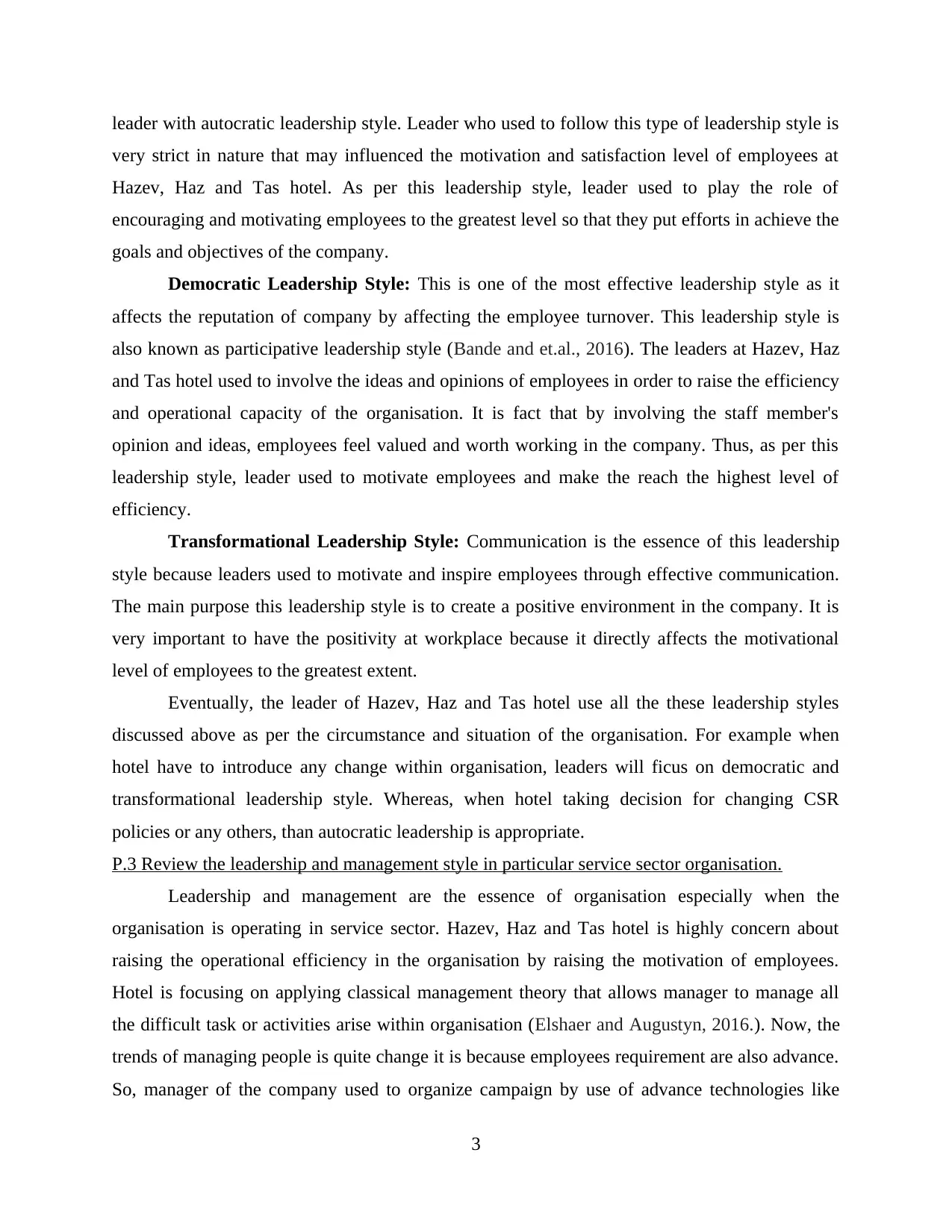
leader with autocratic leadership style. Leader who used to follow this type of leadership style is
very strict in nature that may influenced the motivation and satisfaction level of employees at
Hazev, Haz and Tas hotel. As per this leadership style, leader used to play the role of
encouraging and motivating employees to the greatest level so that they put efforts in achieve the
goals and objectives of the company.
Democratic Leadership Style: This is one of the most effective leadership style as it
affects the reputation of company by affecting the employee turnover. This leadership style is
also known as participative leadership style (Bande and et.al., 2016). The leaders at Hazev, Haz
and Tas hotel used to involve the ideas and opinions of employees in order to raise the efficiency
and operational capacity of the organisation. It is fact that by involving the staff member's
opinion and ideas, employees feel valued and worth working in the company. Thus, as per this
leadership style, leader used to motivate employees and make the reach the highest level of
efficiency.
Transformational Leadership Style: Communication is the essence of this leadership
style because leaders used to motivate and inspire employees through effective communication.
The main purpose this leadership style is to create a positive environment in the company. It is
very important to have the positivity at workplace because it directly affects the motivational
level of employees to the greatest extent.
Eventually, the leader of Hazev, Haz and Tas hotel use all the these leadership styles
discussed above as per the circumstance and situation of the organisation. For example when
hotel have to introduce any change within organisation, leaders will ficus on democratic and
transformational leadership style. Whereas, when hotel taking decision for changing CSR
policies or any others, than autocratic leadership is appropriate.
P.3 Review the leadership and management style in particular service sector organisation.
Leadership and management are the essence of organisation especially when the
organisation is operating in service sector. Hazev, Haz and Tas hotel is highly concern about
raising the operational efficiency in the organisation by raising the motivation of employees.
Hotel is focusing on applying classical management theory that allows manager to manage all
the difficult task or activities arise within organisation (Elshaer and Augustyn, 2016.). Now, the
trends of managing people is quite change it is because employees requirement are also advance.
So, manager of the company used to organize campaign by use of advance technologies like
3
very strict in nature that may influenced the motivation and satisfaction level of employees at
Hazev, Haz and Tas hotel. As per this leadership style, leader used to play the role of
encouraging and motivating employees to the greatest level so that they put efforts in achieve the
goals and objectives of the company.
Democratic Leadership Style: This is one of the most effective leadership style as it
affects the reputation of company by affecting the employee turnover. This leadership style is
also known as participative leadership style (Bande and et.al., 2016). The leaders at Hazev, Haz
and Tas hotel used to involve the ideas and opinions of employees in order to raise the efficiency
and operational capacity of the organisation. It is fact that by involving the staff member's
opinion and ideas, employees feel valued and worth working in the company. Thus, as per this
leadership style, leader used to motivate employees and make the reach the highest level of
efficiency.
Transformational Leadership Style: Communication is the essence of this leadership
style because leaders used to motivate and inspire employees through effective communication.
The main purpose this leadership style is to create a positive environment in the company. It is
very important to have the positivity at workplace because it directly affects the motivational
level of employees to the greatest extent.
Eventually, the leader of Hazev, Haz and Tas hotel use all the these leadership styles
discussed above as per the circumstance and situation of the organisation. For example when
hotel have to introduce any change within organisation, leaders will ficus on democratic and
transformational leadership style. Whereas, when hotel taking decision for changing CSR
policies or any others, than autocratic leadership is appropriate.
P.3 Review the leadership and management style in particular service sector organisation.
Leadership and management are the essence of organisation especially when the
organisation is operating in service sector. Hazev, Haz and Tas hotel is highly concern about
raising the operational efficiency in the organisation by raising the motivation of employees.
Hotel is focusing on applying classical management theory that allows manager to manage all
the difficult task or activities arise within organisation (Elshaer and Augustyn, 2016.). Now, the
trends of managing people is quite change it is because employees requirement are also advance.
So, manager of the company used to organize campaign by use of advance technologies like
3
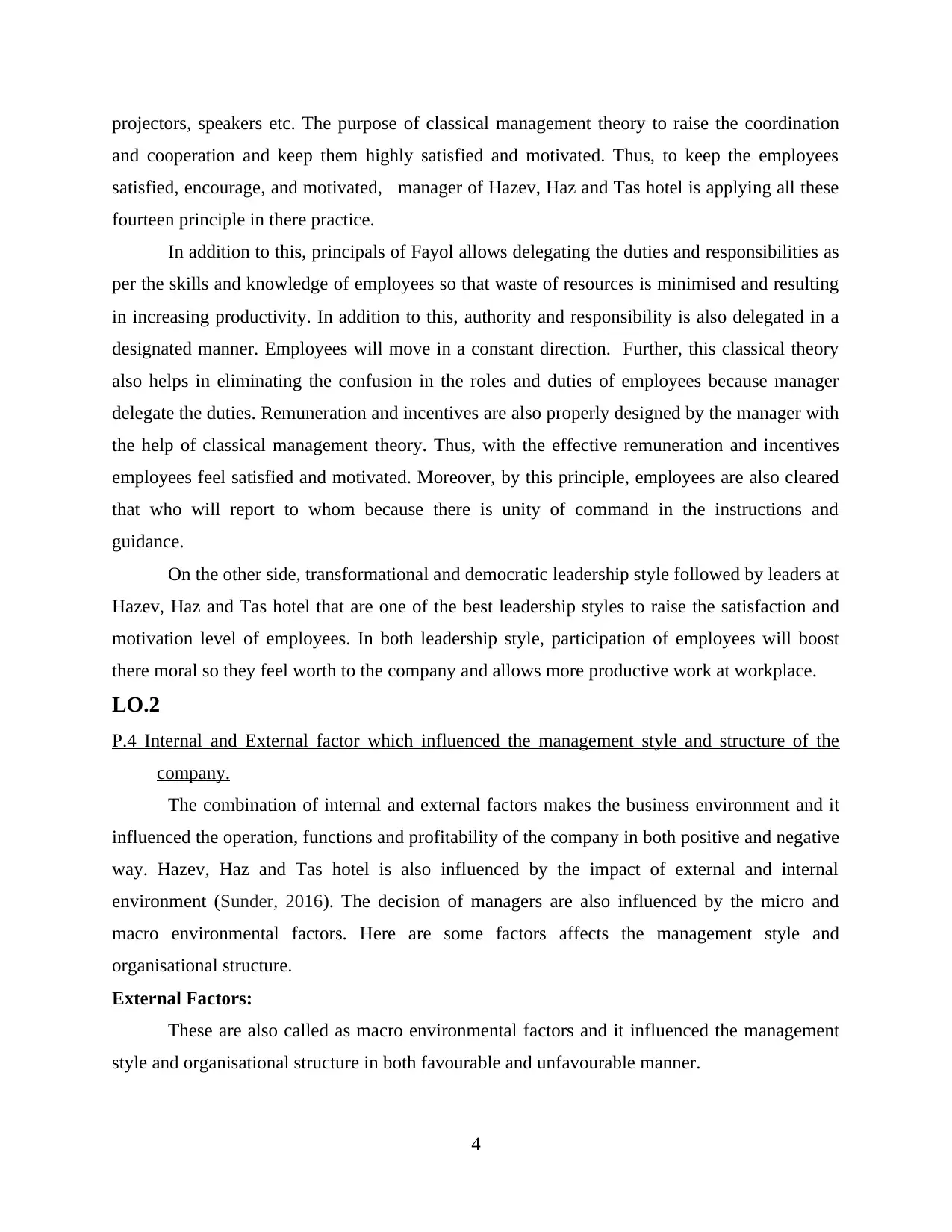
projectors, speakers etc. The purpose of classical management theory to raise the coordination
and cooperation and keep them highly satisfied and motivated. Thus, to keep the employees
satisfied, encourage, and motivated, manager of Hazev, Haz and Tas hotel is applying all these
fourteen principle in there practice.
In addition to this, principals of Fayol allows delegating the duties and responsibilities as
per the skills and knowledge of employees so that waste of resources is minimised and resulting
in increasing productivity. In addition to this, authority and responsibility is also delegated in a
designated manner. Employees will move in a constant direction. Further, this classical theory
also helps in eliminating the confusion in the roles and duties of employees because manager
delegate the duties. Remuneration and incentives are also properly designed by the manager with
the help of classical management theory. Thus, with the effective remuneration and incentives
employees feel satisfied and motivated. Moreover, by this principle, employees are also cleared
that who will report to whom because there is unity of command in the instructions and
guidance.
On the other side, transformational and democratic leadership style followed by leaders at
Hazev, Haz and Tas hotel that are one of the best leadership styles to raise the satisfaction and
motivation level of employees. In both leadership style, participation of employees will boost
there moral so they feel worth to the company and allows more productive work at workplace.
LO.2
P.4 Internal and External factor which influenced the management style and structure of the
company.
The combination of internal and external factors makes the business environment and it
influenced the operation, functions and profitability of the company in both positive and negative
way. Hazev, Haz and Tas hotel is also influenced by the impact of external and internal
environment (Sunder, 2016). The decision of managers are also influenced by the micro and
macro environmental factors. Here are some factors affects the management style and
organisational structure.
External Factors:
These are also called as macro environmental factors and it influenced the management
style and organisational structure in both favourable and unfavourable manner.
4
and cooperation and keep them highly satisfied and motivated. Thus, to keep the employees
satisfied, encourage, and motivated, manager of Hazev, Haz and Tas hotel is applying all these
fourteen principle in there practice.
In addition to this, principals of Fayol allows delegating the duties and responsibilities as
per the skills and knowledge of employees so that waste of resources is minimised and resulting
in increasing productivity. In addition to this, authority and responsibility is also delegated in a
designated manner. Employees will move in a constant direction. Further, this classical theory
also helps in eliminating the confusion in the roles and duties of employees because manager
delegate the duties. Remuneration and incentives are also properly designed by the manager with
the help of classical management theory. Thus, with the effective remuneration and incentives
employees feel satisfied and motivated. Moreover, by this principle, employees are also cleared
that who will report to whom because there is unity of command in the instructions and
guidance.
On the other side, transformational and democratic leadership style followed by leaders at
Hazev, Haz and Tas hotel that are one of the best leadership styles to raise the satisfaction and
motivation level of employees. In both leadership style, participation of employees will boost
there moral so they feel worth to the company and allows more productive work at workplace.
LO.2
P.4 Internal and External factor which influenced the management style and structure of the
company.
The combination of internal and external factors makes the business environment and it
influenced the operation, functions and profitability of the company in both positive and negative
way. Hazev, Haz and Tas hotel is also influenced by the impact of external and internal
environment (Sunder, 2016). The decision of managers are also influenced by the micro and
macro environmental factors. Here are some factors affects the management style and
organisational structure.
External Factors:
These are also called as macro environmental factors and it influenced the management
style and organisational structure in both favourable and unfavourable manner.
4
⊘ This is a preview!⊘
Do you want full access?
Subscribe today to unlock all pages.

Trusted by 1+ million students worldwide
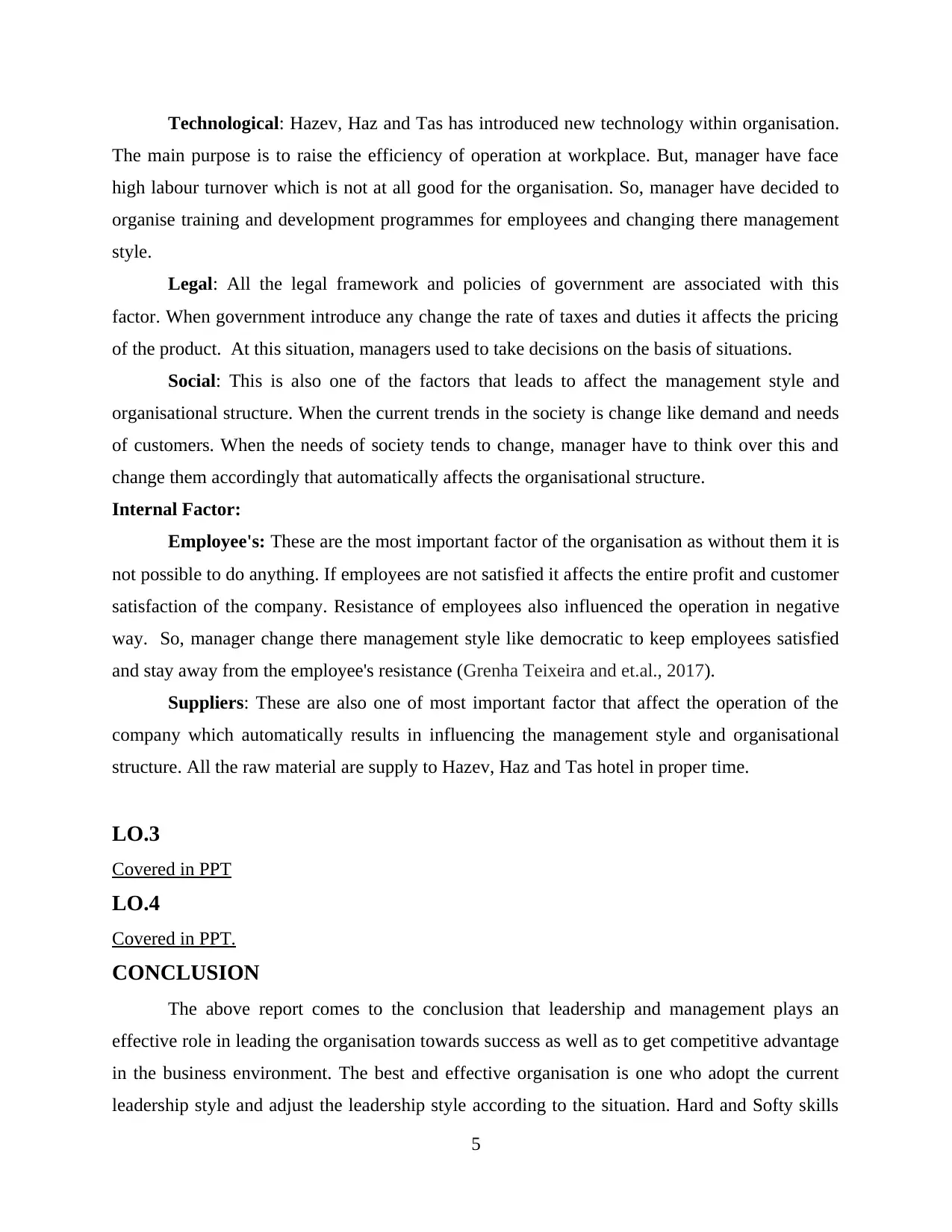
Technological: Hazev, Haz and Tas has introduced new technology within organisation.
The main purpose is to raise the efficiency of operation at workplace. But, manager have face
high labour turnover which is not at all good for the organisation. So, manager have decided to
organise training and development programmes for employees and changing there management
style.
Legal: All the legal framework and policies of government are associated with this
factor. When government introduce any change the rate of taxes and duties it affects the pricing
of the product. At this situation, managers used to take decisions on the basis of situations.
Social: This is also one of the factors that leads to affect the management style and
organisational structure. When the current trends in the society is change like demand and needs
of customers. When the needs of society tends to change, manager have to think over this and
change them accordingly that automatically affects the organisational structure.
Internal Factor:
Employee's: These are the most important factor of the organisation as without them it is
not possible to do anything. If employees are not satisfied it affects the entire profit and customer
satisfaction of the company. Resistance of employees also influenced the operation in negative
way. So, manager change there management style like democratic to keep employees satisfied
and stay away from the employee's resistance (Grenha Teixeira and et.al., 2017).
Suppliers: These are also one of most important factor that affect the operation of the
company which automatically results in influencing the management style and organisational
structure. All the raw material are supply to Hazev, Haz and Tas hotel in proper time.
LO.3
Covered in PPT
LO.4
Covered in PPT.
CONCLUSION
The above report comes to the conclusion that leadership and management plays an
effective role in leading the organisation towards success as well as to get competitive advantage
in the business environment. The best and effective organisation is one who adopt the current
leadership style and adjust the leadership style according to the situation. Hard and Softy skills
5
The main purpose is to raise the efficiency of operation at workplace. But, manager have face
high labour turnover which is not at all good for the organisation. So, manager have decided to
organise training and development programmes for employees and changing there management
style.
Legal: All the legal framework and policies of government are associated with this
factor. When government introduce any change the rate of taxes and duties it affects the pricing
of the product. At this situation, managers used to take decisions on the basis of situations.
Social: This is also one of the factors that leads to affect the management style and
organisational structure. When the current trends in the society is change like demand and needs
of customers. When the needs of society tends to change, manager have to think over this and
change them accordingly that automatically affects the organisational structure.
Internal Factor:
Employee's: These are the most important factor of the organisation as without them it is
not possible to do anything. If employees are not satisfied it affects the entire profit and customer
satisfaction of the company. Resistance of employees also influenced the operation in negative
way. So, manager change there management style like democratic to keep employees satisfied
and stay away from the employee's resistance (Grenha Teixeira and et.al., 2017).
Suppliers: These are also one of most important factor that affect the operation of the
company which automatically results in influencing the management style and organisational
structure. All the raw material are supply to Hazev, Haz and Tas hotel in proper time.
LO.3
Covered in PPT
LO.4
Covered in PPT.
CONCLUSION
The above report comes to the conclusion that leadership and management plays an
effective role in leading the organisation towards success as well as to get competitive advantage
in the business environment. The best and effective organisation is one who adopt the current
leadership style and adjust the leadership style according to the situation. Hard and Softy skills
5
Paraphrase This Document
Need a fresh take? Get an instant paraphrase of this document with our AI Paraphraser
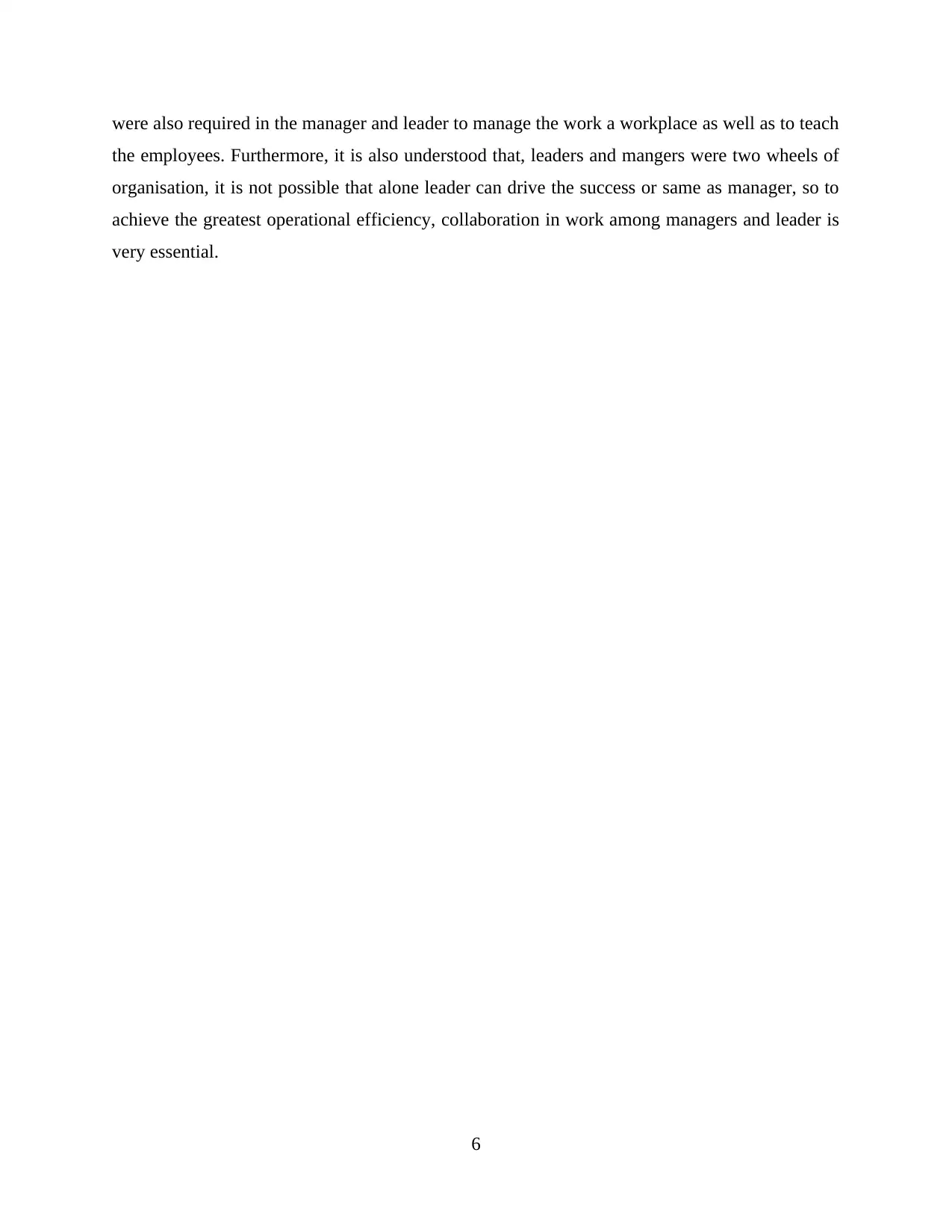
were also required in the manager and leader to manage the work a workplace as well as to teach
the employees. Furthermore, it is also understood that, leaders and mangers were two wheels of
organisation, it is not possible that alone leader can drive the success or same as manager, so to
achieve the greatest operational efficiency, collaboration in work among managers and leader is
very essential.
6
the employees. Furthermore, it is also understood that, leaders and mangers were two wheels of
organisation, it is not possible that alone leader can drive the success or same as manager, so to
achieve the greatest operational efficiency, collaboration in work among managers and leader is
very essential.
6
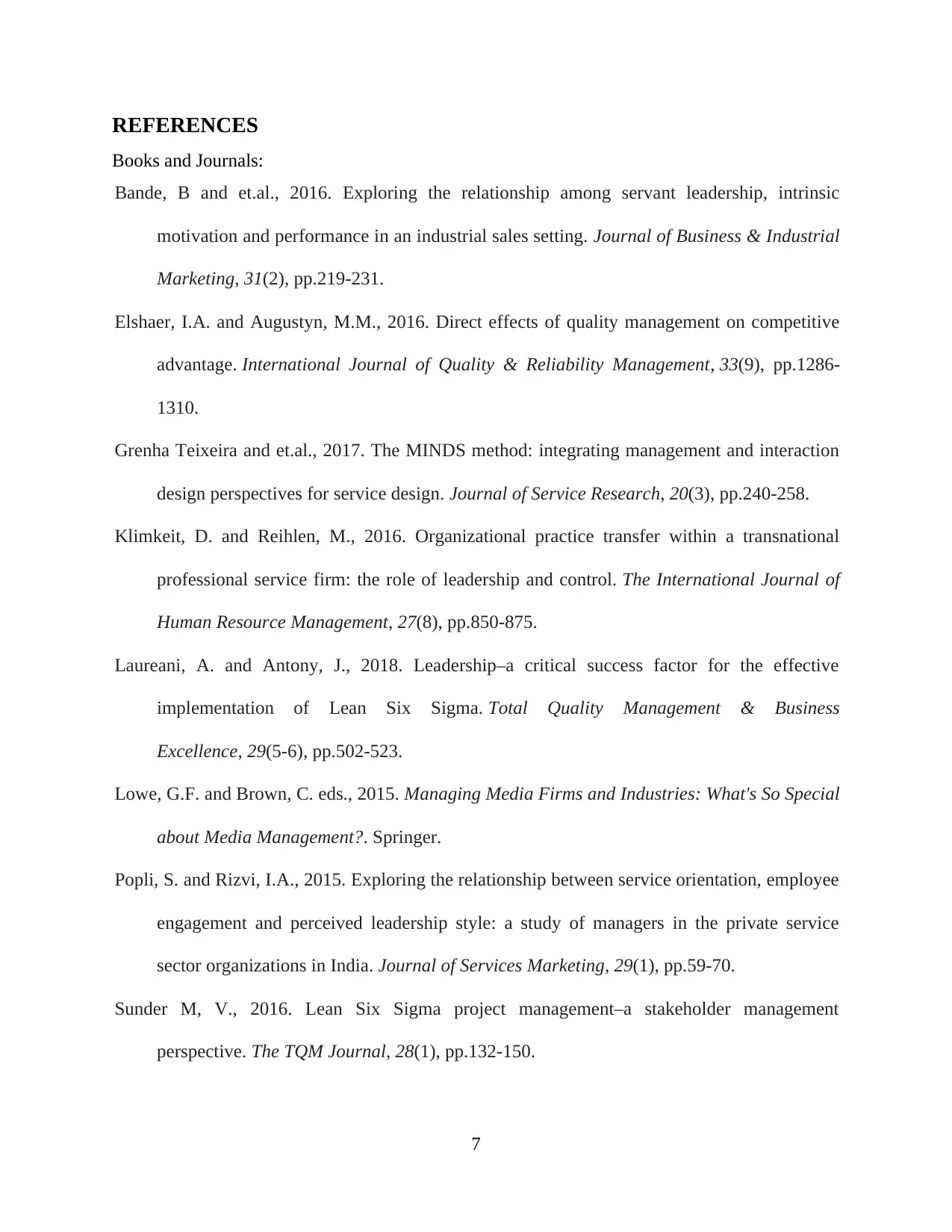
REFERENCES
Books and Journals:
Bande, B and et.al., 2016. Exploring the relationship among servant leadership, intrinsic
motivation and performance in an industrial sales setting. Journal of Business & Industrial
Marketing, 31(2), pp.219-231.
Elshaer, I.A. and Augustyn, M.M., 2016. Direct effects of quality management on competitive
advantage. International Journal of Quality & Reliability Management, 33(9), pp.1286-
1310.
Grenha Teixeira and et.al., 2017. The MINDS method: integrating management and interaction
design perspectives for service design. Journal of Service Research, 20(3), pp.240-258.
Klimkeit, D. and Reihlen, M., 2016. Organizational practice transfer within a transnational
professional service firm: the role of leadership and control. The International Journal of
Human Resource Management, 27(8), pp.850-875.
Laureani, A. and Antony, J., 2018. Leadership–a critical success factor for the effective
implementation of Lean Six Sigma. Total Quality Management & Business
Excellence, 29(5-6), pp.502-523.
Lowe, G.F. and Brown, C. eds., 2015. Managing Media Firms and Industries: What's So Special
about Media Management?. Springer.
Popli, S. and Rizvi, I.A., 2015. Exploring the relationship between service orientation, employee
engagement and perceived leadership style: a study of managers in the private service
sector organizations in India. Journal of Services Marketing, 29(1), pp.59-70.
Sunder M, V., 2016. Lean Six Sigma project management–a stakeholder management
perspective. The TQM Journal, 28(1), pp.132-150.
7
Books and Journals:
Bande, B and et.al., 2016. Exploring the relationship among servant leadership, intrinsic
motivation and performance in an industrial sales setting. Journal of Business & Industrial
Marketing, 31(2), pp.219-231.
Elshaer, I.A. and Augustyn, M.M., 2016. Direct effects of quality management on competitive
advantage. International Journal of Quality & Reliability Management, 33(9), pp.1286-
1310.
Grenha Teixeira and et.al., 2017. The MINDS method: integrating management and interaction
design perspectives for service design. Journal of Service Research, 20(3), pp.240-258.
Klimkeit, D. and Reihlen, M., 2016. Organizational practice transfer within a transnational
professional service firm: the role of leadership and control. The International Journal of
Human Resource Management, 27(8), pp.850-875.
Laureani, A. and Antony, J., 2018. Leadership–a critical success factor for the effective
implementation of Lean Six Sigma. Total Quality Management & Business
Excellence, 29(5-6), pp.502-523.
Lowe, G.F. and Brown, C. eds., 2015. Managing Media Firms and Industries: What's So Special
about Media Management?. Springer.
Popli, S. and Rizvi, I.A., 2015. Exploring the relationship between service orientation, employee
engagement and perceived leadership style: a study of managers in the private service
sector organizations in India. Journal of Services Marketing, 29(1), pp.59-70.
Sunder M, V., 2016. Lean Six Sigma project management–a stakeholder management
perspective. The TQM Journal, 28(1), pp.132-150.
7
⊘ This is a preview!⊘
Do you want full access?
Subscribe today to unlock all pages.

Trusted by 1+ million students worldwide
1 out of 9
Related Documents
Your All-in-One AI-Powered Toolkit for Academic Success.
+13062052269
info@desklib.com
Available 24*7 on WhatsApp / Email
![[object Object]](/_next/static/media/star-bottom.7253800d.svg)
Unlock your academic potential
Copyright © 2020–2025 A2Z Services. All Rights Reserved. Developed and managed by ZUCOL.





